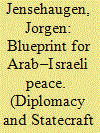| Srl | Item |
| 1 |
ID:
134601


|
|
|
|
|
| Summary/Abstract |
After the 1973 Arab–Israeli war, the American Secretary of State, Henry Kissinger, conducted a series of negotiations between Israel and its Arab adversaries, culminating in three disengagement agreements. As successful as these were, by late 1975 Kissinger’s step-by-step approach had stagnated. New approaches seemed essential to push the peace process forward. Throughout 1975, a Brookings Institution study group wrote a report on how the United States could better approach Arab–Israeli peacemaking. It recommended a comprehensive approach, aimed at solving all outstanding questions, by including all the parties within the same framework. The recommendations advocated including the Soviet Union in the peace process and that the Palestinians should represent themselves. The report was highly influential on President Jimmy Carter’s subsequent approach towards the Arab–Israeli conflict—and many of the report’s authors staffed his Administration. Carter’s perceived adaptation of the report aggrieved the Israelis, whilst for others the Brookings report served as a normative benchmark for the Carter presidency.
|
|
|
|
|
|
|
|
|
|
|
|
|
|
|
|
| 2 |
ID:
141552


|
|
|
|
|
| Summary/Abstract |
For decades, the partnership between Egypt and the United States was a linchpin of the American role in the Middle East. Today, it is a mere vestige of a bygone era. There are no longer any compelling reasons for Washington to sustain especially close ties with Cairo. What was once a powerfully symbolic alliance with clear advantages for both sides has become a nakedly transactional relationship—and one that benefits the Egyptians more than the Americans. The time has come for both sides to recognize that reality and for the United States to fundamentally alter its approach to Egypt: downgrading the priority it places on the relationship, reducing the level of economic and military support it offers Cairo, and more closely tying the aid it does deliver to political, military, and economic reforms that would make Egypt a more credible partner.
|
|
|
|
|
|
|
|
|
|
|
|
|
|
|
|
| 3 |
ID:
130471


|
|
|
|
|
| Publication |
2014.
|
| Summary/Abstract |
Contrary to popular myths and conspiracy theories about Washington's desire to control the Middle East, for the past six decades, U.S. policymakers have usually sought to minimize the United States' involvement there. But the high-stakes nature of American interests in the region -- particularly oil -- and the complexity of the Middle East's problems always seem to draw the United States back in. In spite of himself, U.S. President Dwight Eisenhower was sucked into the Suez crisis in 1956 and the pan-Arabist revolts of the late 1950s. Lyndon Johnson barely lifted a finger to prevent the Six-Day War in 1967. Richard Nixon found himself grudgingly drawn into the region by the 1973 Arab-Israeli war and the superpower nuclear crisis it caused. Despite his aggressive image, Ronald Reagan did little in response to repeated attacks in Lebanon and the Persian Gulf by Iran and its proxies. George H. W. Bush came to office hoping to ignore Saddam Hussein, not to go to war with him. And although it is rarely remembered today, George W. Bush was not particularly interested in the Middle East and paid little attention to the region prior to the 9/11 attacks.
|
|
|
|
|
|
|
|
|
|
|
|
|
|
|
|